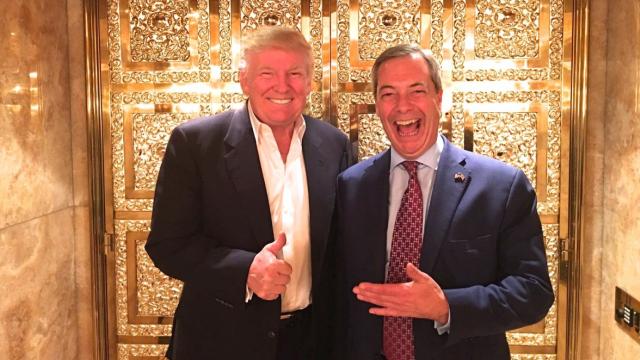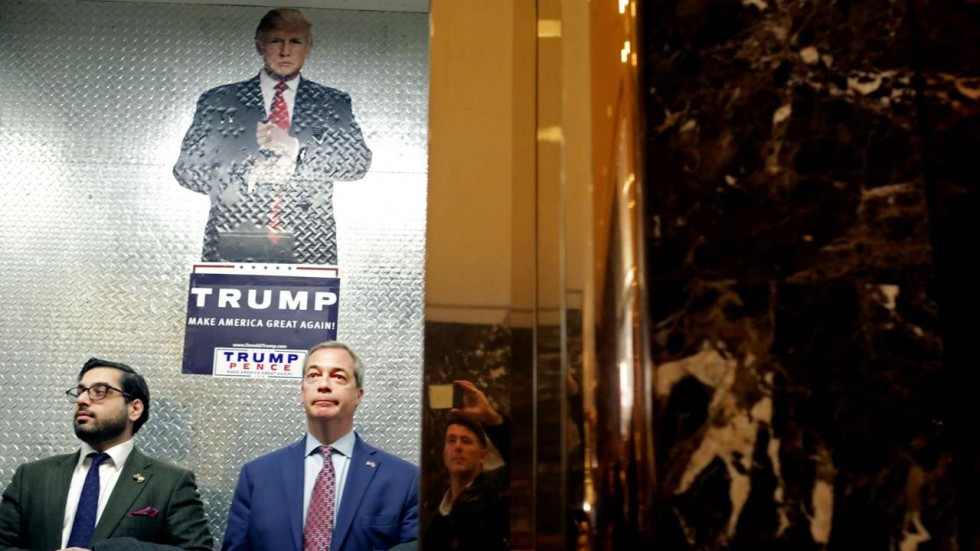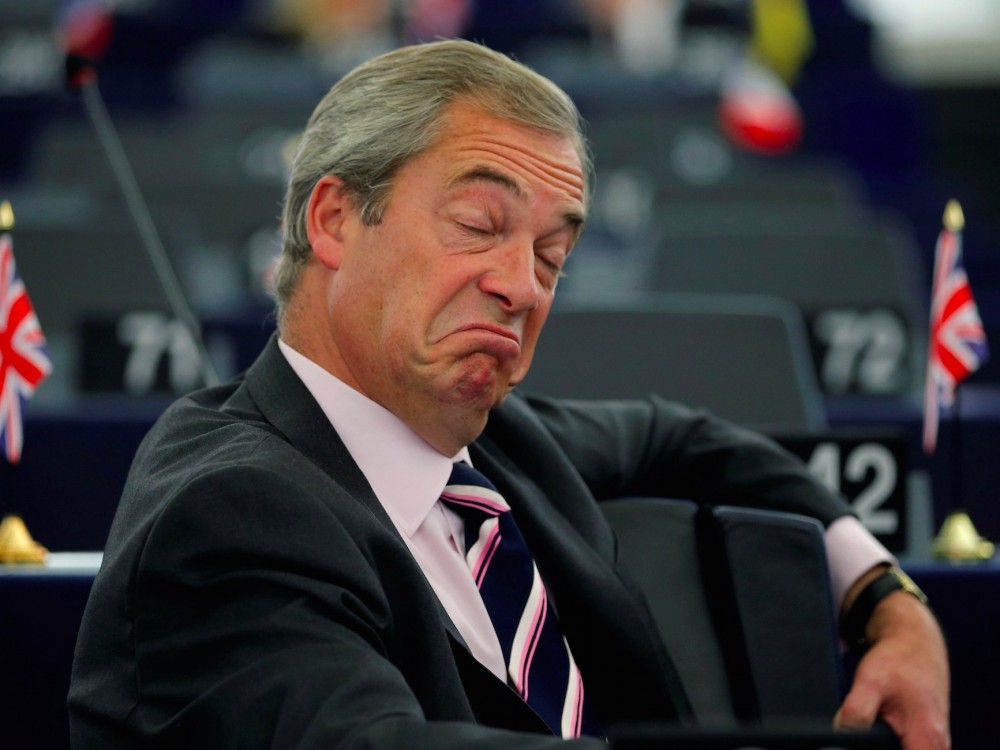
On Nov. 9, the U.K. woke up to news that Donald Trump had been elected the 45th president of the United States – leaving a population stunned, dazed and bewildered, with unnerving similarity to the morning just four and a half months ago when the people of Britain awoke to discover Leave had triumphed over Remain in the EU Referendum.
The "Brexit mindset" – a dramatic stab against the establishment that threw the world off its polar axis on June 23 – has now been replicated in the U.S. Both Brexit and Trump’s victory were born out of a fiercely reactionary and revolutionary movement to abandon politics as usual. To desert the safety of engraved societal structures. To embark on a brave new journey, led by the unknown.
The Brexit vote sent shockwaves across the world, but none felt it more than the rejected European establishment. As In Defence of Marxism commented, it was “a crushing vote of no confidence in the Establishment.”
Part of the reason Brexit was such a shocker was that the pollsters got their predictions so painfully wrong. They forecast it would be close, but the ruling class, its political representatives and much of the population had little idea how serious the public's mindset of revolt really was. The sense of discontentment in Britain was underestimated, underreported and it took something as dramatic as Brexit to make the outrage heard.
Even chief Brexit herald Nigel Farrage underestimated the impact of his campaign, admitting he thought it would marginally swing Stay Camp’s way in the eleventh hour of the voting day. As Britons went to bed on June 23, with the Pound gaining strength due to a Remain victory forecast, Remainers felt confident their vote wouuld be the winning one. The fact that they were so confident made the loss even more devastating and surprising.
Uncannily Similar Disbelief has Seized the U.S. Less than Five months Later
Pollsters’ erroneous forecasts about the EU Referendum were mirrored in the forecasts of the U.S. presidential election. Nearly all of the polls showed Clinton ahead up to the end. But as we saw with Brexit, the outsider still won. How did it happen? Clearly the lesson wasn't learned from Brexit: that the people are tired of status quo political structures, they want change, and they’re going to get it.
On the announcement of the presidential election results, Britain’s leading politicians felt duty-bound to give their reaction to Trump’s victory. While Prime Minister Theresa May and foreign secretary Boris Johnson congratulated Trump, Labour leader Jeremy Corbyn provided a more candid appraisal of the outsider’s win, which he characterized as the “unmistakable rejection of a political establishment and an economic system that simply isn’t working for most people. It is one that has delivered escalating inequality and stagnating or falling living standards for the majority, both in the U.S. and Britain.”
Corbyn added that Trump’s rise to office is testament to the widespread rejection of a “governing elite,” a “failed economic consensus,” and rising public anger producing “political upheavals across the world," which have a sent a global wakeup call for change.
The responses to Corbyn’s remarks were mixed. Some congratulated the Labour leader for showing a “mature understanding of the political climate.” Others criticized Corbyn for his lack of reproach toward a man whose election was marked by racism, sexism and bigotry.
Now, the inevitable question being asked is: If an outsider like Trump can win his way into the highest office, could Corbyn do the same, despite polls that claim otherwise? Time will tell.
On an economic note: According to estimates, Donald Trump is worth around $3.7 billion, and the real estate tycoon’s campaign committee managed to pump around $240 million of that wealth into his presidential campaign. Not only did Trump rely on anti-establishment rhetoric to stir the American public into a voter frenzy, but he also relied on his personal fortune. Whether his adoring, working class fans recognized it or not, Trump's success comes not from outside but from the heart of the business establishment.
The Media's Dubious Role
The impact the media played in shaping the U.S. election can also be paralleled to the Brexit upset. Dr. Andy Pickard, former Head of Education at Manchester Metropolitan University, told Occupy.com that the connections between the two "outside" winners and the media are strong.
“The truly frightening additional dimension to Trump's win when compared to Brexit was the introduction of demagoguery," said Pickard. "Farage might have worked the same vein of right wing populism but his appeal stopped short of the kind of fascism exhibited by Trump. Nor must we allow the likes of Trump to successfully claim to be outside the establishment. Trump is at the heart of the business and media establishment and his policies will reflect this. What he and his kind are attacking are those progressive ideas and sense of shared humanity which have sought to ameliorate the destructive effects of neoliberalism.”
The statistics relating to media coverage in the U.S. election and EU Referendum paint a clear picture. According to the media tracking company Mediaquant, from July 2016 to the end of October 2016, Trump received $5.6 billion worth of earned media (publicity effectively earned through promotional, word of mouth methods), which included television and radio news segments as well as podcasts, blog posts and mentions on social media. During the same period, Hillary Clinton benefited from significantly less coverage, generating a comparatively meagre $3.5 billion worth of earned media.
In the U.K., the media’s role in shaping the Brexit decision was astonishing. Images on the front pages of the Daily Mail and the Sun, two of Britain’s biggest newspapers, draped in the Union Jack, urged readers to “BeLEAVE in Britain.” Most the biggest outlets showed overwhelming support for Brexit, accounting to four times as many readers as their Remain rivals. Curiously, most of the U.S. media was stacked not for, but against Trump, yet the result was the same.
Populist Delusion and an Introduction of Demagoguery
The point raised by Pickard concerning Trump's demagoguery deserves further exploration. The manipulative approach, which appealed to people’s prejudices and opposed their rational sides, was evident in both the Brexit and Trump campaigns.
Farrage and Trump, two high-profile populists, waged populist campaigns centered on the demonization of immigrants. Instead of learning from the mistakes of Brexit – ie. when the demagogues win power, they generally have little idea what to do – the U.S. followed in Britain’s Brexit footsteps.
As we've seen in the wake of Brexit, putting power in the hands of demagogues has unleashed a political, economic and social beast that might just not be the change the "establishment revolutionaries" were looking for. Britain’s decision to leave the EU has ushered us into a new era of uncertainty, which is now amplified by Trump’s triumph.
In the immediate aftermath of Brexit, the value of the Pound tumbled. Then, when the new Prime Minister Theresa May outlined dates for starting Brexit negotiations, the Pound fell to a three-year low against the Euro. Inflation continues to rise in the U.K., with consumers paying the price. The cost of petrol, for example, has hit its highest level in a year, shifting the economic burden on to the poorest.
As Pete, from Manchester, told Occupy.com, “I voted to Leave in June and yes, I guess I’m now regretting it. I don’t think any of us had realized the financial impact and how we would be out of pocket almost immediately.”
Brexit played on the fears of a disenfranchised working class, a tactic mirrored in Trump’s campaign. The U.S., by following Britain’s example and voting for a populist, anti-immigrant platform of the far-right, can expect tumultuous times ahead. And ironically, as we’ve seen in Britain, it is the 99%, who, by embracing the far-right sentiments of the 1%, will feel the pinch the hardest.
3 WAYS TO SHOW YOUR SUPPORT
- Log in to post comments

















Comments
Melanie Brown replied on
Typos!
Better send this artical back to the editor, if I can find typos, there must be more, lol
Larry replied on
Really!?
Sorry, I read the article carefully and didn't see any typos. Feel free to point them out....
DH Fabian replied on
Where the US Stands
It's a different world outside of the US. Elsewhere, they grasp the consequences of a grotesquely failed capitalism -- poverty. They understand the thin line between working class and desperately poor. The US is far from reaching that point, as our media show. Here, poverty is regarded either as a lifestyle choice or as appropriate punishment for the undeserving. Splitting the middle class against the poor, and the poor against each other by race, has left the proverbial masses impotent.